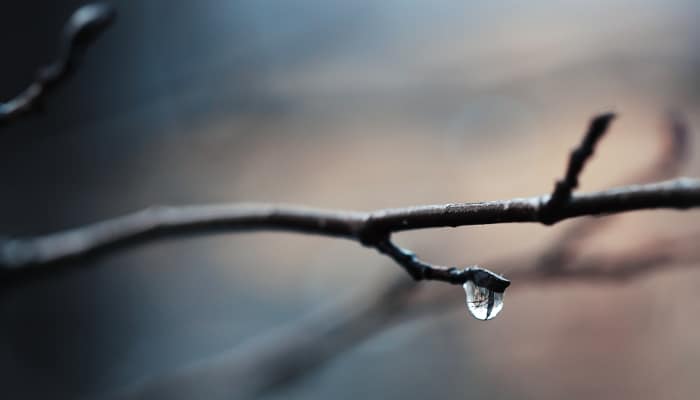Article: Reflections on Loss at the Winter Solstice
By Isa Gucciardi, Ph.D.
Editors’ Note: The following is an address that was delivered by Isa Gucciardi, Ph.D., at the First Unitarian Universalist Church in San Francisco, at the Spirit Babies Ceremony.
Summary: The winter solstice is an ideal time for going inward, and the experience of loss presents an opportunity to open up to ourselves more fully, through our emotional reaction to the world not being what we once thought it to be.
We are gathered here this evening of the winter solstice. This is the longest night of the year, and it is honored by many traditions as a sacred and rich time. In Latin, solstice means sun set still and winter solstice is the great stillness before the sun’s strength builds, and days grow longer. It is a time when everything lies dormant in the silent night. At this time of year, the earth reaches into the darkness of the winter night and our experience is driven by that darkness. The days are shorter and shorter as the nights invite us to focus more deeply inward, to reach more and more fully into the deepest recesses of our psyche.
For those of us who have experienced loss, these times can challenge us to know ourselves in new ways as we are brought into the experience of hidden or latent aspects of ourselves. These aspects of ourselves may have always existed, but we may have tried to navigate around them, as the experience that loss reveals can be painful and confusing. The dark nights of winter offer us the stillness and space to examine our relationship to our loss, and to understand the nature of our grief. It is important to take the time to know our experience. It is important not to shy away from what can be the most difficult path we walk down as human beings. We must allow our loss to become part of the world that emerges from our experience, and we must remember that this path, however difficult, reveals an ever deepening understanding of ourselves, and our relationship to the cycles of life and death. In human experience there is no greater mystery, and as difficult as it is to walk this road, we must realize that through our loss, we have been offered the opportunity to deeply touch the mystery of who we are.
When we talk about our relationship to loss, we begin to perceive the nature of our grief. Perhaps the largest lesson loss provides is that things do not always turn out the way we thought or hoped they would. Coming to terms with this fact without moving into despair or denial is a challenge for all of us. Things simply are as they are, not as we would have liked them to be. It is important to meet this fact simply and honestly. It is tempting to want to twist away from this stark truth, but we must try to stay with it without rejecting our own or others’ experience.
Grief and loss show us we have much less control over events than we like to admit. When an overwhelming loss occurs, it shatters our ability to maintain our beliefs and images of the world. We feel disoriented and confused. We may believe that we cannot cope with events, or we may struggle with the realization that we are unable to hold our experience or direct our experience. Yet, if we allow loss to rumble through the deepest levels of our being, we begin to experience ourselves in an entirely new way. As we move through our destabilization, our disorientation, our loss of compass, we come to know the world in a new way. If we sit with our loss and try to understand it, we can begin to regain equilibrium. As difficult as these experiences are, they open us to ourselves and challenge us to know who we are in relationship to the mysteries of life and death in a new way.
Overwhelming loss invites us to look beyond our usual ways of structuring our reality. We often have to look outside ourselves, or beyond ourselves, or at least beyond our usual ways of thinking and feeling to find balance. When we experience loss, we are willing to go beyond ourselves in ways we are not always willing to when things are going the way we thought they might. This is one of the gifts that loss provides. It encourages us to encounter the world in a new way as we set out on a quest to reorient ourselves to the world that emerges out of the experience of loss. This can lead to greater depths of understanding about who we are, what the world is, and nature of the relationship between the two.
The process of adapting to that which seems impossible to adapt to is a process that leads us to greater awareness and to a broader consciousness. But we cannot benefit from the lessons of loss if we allow ourselves to become lost in our reactivity to the lack of control we feel in the face of loss. Of course, it is devastating to lose someone we love, or long to love. But death is part of life, not separate from it. If we are lucky, we can make the decision to allow the lessons that our reactions to loss reveal. Following the path these lessons reveal can lead us deeply within ourselves. These winter nights provide the space and time we need to be able to know ourselves more deeply. This is a perfect moment to move more deeply into the deepest part of ourselves, and our loss provides us the illumination we need to find ourselves in places where we may have not ventured to explore before.
Learning to be with loss is the process of learning how to meet what is happening without any defenses, learning how to be with what is without reacting. Paradoxically, in order to be able to be present with loss without being swept away by our reactivity, we have to allow ourselves to go fully into the reactions that make up our experience of grief. Every person has their unique path through the experience of grief. We must allow ourselves the full and complete exploration of our grief, free from the judgments or expectations of others. No one else can really know what our own path through grief holds for us, and even we cannot know what it holds for us if we do not allow ourselves to follow this path without the weight of our own expectations about how we should or ought to be with our loss.
In exploring our grief, we are exploring our reactivity. In exploring our reactivity, we explore how we reject the idea that life is not what we wanted it to be. If we are lucky, when we understand we are not in control of what is happening, we begin to understand that we do have control over how we react to what is happening. In an effort to relieve ourselves of the pain that our reactivity generates, we find ourselves coming face-to-face with aspects of our experience that may have lain dormant until the moment of our loss. These reactions may range from denial, to anger, to bargaining, to depression, to hatred, to jealousy, to rage, to despair, to hopelessness, to a rejection of our powerlessness. It is important to explore what our true reactions are without judgment or prejudice. We must walk the path that loss opens to us without cultivating self-pity or despair, but without rejecting them either.
I would like to offer a story, drawn from the Buddhist tradition as reported in Two Simple Happenings (twosimplehappenings.blogspot.com) that illuminates one woman’s movement through all these reactions at the loss of her child.
There was once a woman from the city of Savatthi by the name of Kisa Gotami, known for her wisdom and kindness. Her many uncountable merits earned her, as a husband, the son of a nobleman, and she bore him a single child. In the dark of a storm, in a flash of lightning, with animals baying just outside her window, Kisa Gotami realized that her baby was not crying. Death had claimed the child in his sleep.
Kisa Gotami pleaded with God and the spirits, and with every devil by name, but none of them would answer her prayers. Thus, her dead babe in arm, she went out into the morning marketplace to find a medicine that could cure death.”Please,” she would plead to the merchants. “My son needs medicine. He’s ill.””Kisa, your son is dead.”But she would not hear their words. Thus she wandered the market, asking everyone if they knew a medicine for death. The woman the whole city once looked to for advice was now the center of everyone’s pity. “Gone mad, she has,” some said. “She’ll come to her wits,” said others. “It may be kinder to kill her,” said others still. Every single body in the city was moved by Kisa Gotami’s sorrow. She arrived with her dead baby to a certain apothecary and, once again, begged for a medicine with which to cure death. The apothecary, having been given warning of Kisa Gotami’s coming, pretended to consider her question long and hard. Finally, he told her, “No. No, I don’t have anything to cure death. But if anyone does, it would be the ascetic Gautama. He was a brilliant doctor before he retired, you know.” “Where can I find this man?” Gotami screamed, clutching her dead child. “He is staying in the Jeta Grove, where they’re building the monastery.” Gotami fled the medicine shop without another word. That same day, she rushed into the Jeta Grove, where the Buddha was lecturing a large assembly, many of whom knew of Kisa Gotami’s plight. Crying, reeking of death, and stained by the city, Gotami threw herself at the Buddha’s feet, disturbing the lecture and laying her dead son flat on his back. “Remove her,” someone grumbled. “Stay your tongue,” came a reply. “That is Kisa Gotami. She can’t be held accountable for what she does.””Please,” Kisa Gotami said, ignoring the murmurs about her. “I’ve been told that you once practiced medicine, and that you knew a cure for death. I beg you, sir, bring my son back to life. Please! My husband is amongst the city’s wealthiest – I can pay you any fee.” A silence of pity spread through the crowd, and the Buddha looked on the distraught mother in silence. “Please!” She cried. Still the Buddha was silent. “Do you know the cure or not? I beg you!””Yes,” the Buddha said. “I know the cure for death.” A collective gasp went through the crowd, and the Buddha’s closest disciples gave him a suspicious look. “Any price,” Gotami said, weeping. “Anything!” “Very well,” the Buddha said. “I require but a mustard seed — the other reagents I have. But it cannot be any common mustard seed. It must come from a family that has never known death. If you bring me such a seed, I will be able to prepare your cure.” “Oh, most generous doctor! Enlightened sage! Thank you! Thank you!” “Ah — leave the child,” the Buddha said, as Gotami stood. “I can prepare the rest of the cure while you search.” For the first time in two days, Kisa Gotami traveled without the presence of her son’s corpse. When she was finally out of sight, the Buddha cast his gaze at the child’s body, rotted, riddled with maggots and broken. “Come, Ananda. We must cremate Kisa Gotami’s son.” Kisa Gotami searched Savatthi with impeccable order, going from home to home, and asking everyone the same question. “Can you spare a mustard seed?” “I don’t see why not.” “Thank you! But—has your family ever known death?” “Yes, Gotami. Only four months ago, my father passed. You were there, remember?” “Yes, Gotami. My parents and their parents, and the brothers of them all are all dead and gone. I am alone in the world.” “Yes, Gotami. My son was slain in battle.” “…killed by wolves.””…executed…””…drowned herself…””…fell from a partition…””…died from a cold…”
“I am the only one left of my family, Kisa Gotami.” Kisa Gotami, battered and coated in filth, knelt in the mud of a long-due rainstorm and said to herself, “My son is dead.”
Pellets of water battered her forehead and streaked the dirt down her face. “My son is dead.” Kisa Gotami returned to the Jeta Grove and found the Buddha, sweeping wood-dust from the construction site. “Kisa Gotami,” the Buddha said in greeting.”Blessed Sage,” Kisa replied. She was smeared over with the grime of the road, and old tears had carved paths through the dirt on her cheek. Despite this, the Buddha said, “Your wandering has done you well.””Oh, Gautama, how selfish was my grief. I went from family to family, and pretended for two long days that there might exist some clan of immortals. Those wives alive in Savatthi who haven’t already lost a son are bound to lose one someday. And if they never lose a son, then a son is bound to lose a mother. And how many parents lay buried beneath our feet!” “Your observation is accurate in every way, Kisa Gotami. Neither those wise nor those foolish are immune to death. However great a father roars, he can never waken a dead daughter. However much a mother begs the gods, a dead son will never cry again. One by one, Gotami, we each die. This is but a greater disappointment among a thousand lesser ones, and just as a Sage does not mourn a broken pot, a Sage does not mourn death.”Your tears painted trails down your face, once, Gotami, but those trails did not lead you to peace of mind. For four days, you suffered the elements as if you wandered a jungle instead of the heart of a great city. But your sorrow accomplished nothing for your son. Be prepared, Gotami, for you will suffer many other deaths in your time, and some day, your own. Destroy the attachment that causes your grief, and you will lead a better life.”Thus Kisa Gotami took her first step down the path of wisdom. And the Buddha finished sweeping the floor.
Although we are here on the longest night, tomorrow is the time when the light begins to grow longer, and we will find ourselves moving outward into the world bringing the insights we gain through our willingness to be with our loss into the brighter light of the lengthening sun. The path of understanding that opens before us as we experience loss is an understanding that cannot be taken from us. If we choose, we can allow the experience of loss to teach us how to gain balance in the midst of the most disorienting aspects of our experience. We can do this by deeply engaging with our reactivity and bringing it into balance through the revelation of the deepest roots of that reactivity. This requires courage. This requires heart. And it requires a dedication to our own enlightenment and well being. If we pay attention and determine to learn all the lessons we can learn from our experience, we can truly come to know the truth in these lines, drawn from a Native American prayer: Naked you came from Earth the Mother. Naked you return to her. May a good wind be your road. Therefore we do not lose heart. Though outwardly we are wasting away, yet inwardly we are being renewed day by day. For our light and momentary troubles are achieving for us an eternal glory that far outweighs them all. So we fix our eyes not on what is seen, but on what is unseen. For what is seen is temporary, but what is unseen is eternal.
LIKE THIS ARTICLE? SIGN UP FOR FREE UPDATES!



